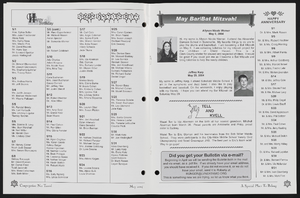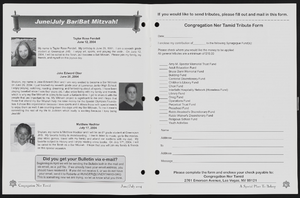Search the Special Collections and Archives Portal
Search Results
Jana Wilcox Lavin (Opportunity 180) oral history interview conducted by Kelliann Beavers: transcript
Date
Archival Collection
Description
From the Lincy Institute "Perspectives from the COVID-19 Pandemic" Oral History Project (MS-01178) -- Education sector interviews file.
Text
Karin Hilgersom (Truckee Meadows Community College) oral history interview conducted by Magdalena Martinez and Elia Del Carmen Solano-Patricio: transcript
Date
Archival Collection
Description
From the Lincy Institute "Perspectives from the COVID-19 Pandemic" Oral History Project (MS-01178) -- Education sector interviews file.
Text

Martin Lopez Castillo oral history interview: transcript
Date
Archival Collection
Description
Oral history interview with Martin Lopez-Castillo conducted by Nathalie Martinez, Elsa Lopez, and Barbara Tabach on January 11, 2020 for the Latinx Voices of Southern Nevada Oral History Project. Martin Lopez Castillo was born in a small town in the State of Mexico. He immigrated to Phoenix, Arizona in the early '90s where he worked in construction and landscaping. Eventually, he made his way to Colorado where he began working as a cook. He moved to Las Vegas with his family in the early 2000s where he arrived in Las Vegas' Downtown. He worked in the mine by Primm, Nevada before becoming a gardener. His work has allowed him to see the changes that have happened in Southern Nevada, and he recounts the changes that have happened in Downtown Las Vegas since the 2008 recession. He is a self-taught English speaker and an avid chess collector. Subjects discussed include: Immigration, Chess, Landscaping, Teaching, and Downtown Las Vegas.
Text
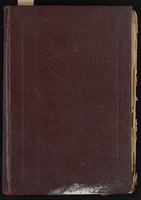
Bluebell Girls: scrapbook of newspaper clippings and photographs
Date
Archival Collection
Description
From the Margaret Kelly Collection on the Bluebell Girls, MS-00604. The scrapbook includes newspaper clippings about the Bluebell Girls, Folies-Bergère, and dancer Catherine Dunne's experiences in Milan, Italy at the start of World War II.
Mixed Content
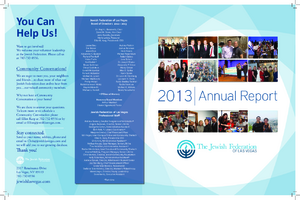
Annual Report of the Jewish Federation of Las Vegas, 2013
Date
Archival Collection
Description
Annual report from the Jewish Federation of Las Vegas for 2013.
Text
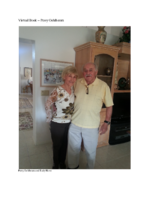
Biographical essay by Perry Oehlbaum, 2014
Date
Archival Collection
Description
Perry Oehlbaum describes her time in concentration camps in Germany and her liberation in 1945.
Text

John McKay interview, March 3, 1980: transcript
Date
Archival Collection
Description
On March 3, 1980, Donna Malloy interviewed John McKay (b. July 7th, 1926 in North Dakota) about his life in Las Vegas, Nevada. McKay begins by speaking about his family history, his career in the electronics and engineering field for aerospace, as well as his experiences in two wars. Moreover, McKay speaks about his hobbies of hunting and fishing and his time as a musician around Las Vegas. McKay also spends time going over how the city of Las Vegas has grown and changed, the increase in crime, and the extreme floods in the 1950s. Lastly, McKay talks about the Nuclear Test Site, how casino gaming chips were used as money around the city, how the city of Las Vegas started and the future of the valley.
Text

Transcript of interview with Mahamed Youssouf by Barbara Tabach, August 6, 2013 & August 13, 2013
Date
Archival Collection
Description
Ethiopian business owner Mahamed Youssouf became an American citizen in 1986. Born in Harar, Ethiopia, he recalls the hardships he had to endure during the Ethiopia-Somalia conflict. Coming from a family of tailors, he began making clothes with his father at a very early age. Mahamed’s recollections concerning his journey from political refugee to successful businessman demonstrates his resilience and determination to overcome obstacles and achieve his goals. Mahamed moved to Las Vegas, Nevada in 1985, where he rented a storefront in North Las Vegas. The name of his store was Uniform Plus and he focused mainly on making children’s clothes. His efforts proved lucrative as he began buying wholesale in Los Angeles, California, and selling clothes in Las Vegas on the weekends at the outdoor Swap Meet. After a fateful encounter, Mahamed became business partners with Eugene Hoffman, owner of Village East Cleaners. Mahamed firmly believes that communication is the key to socio-economic success. He views education as an investment and states that, “to have dialogue means better relationships.” When the Ethiopian government was overthrown, Mahamed returned home to Africa for a visit. He met his wife while there, got married, and started a family. Mahamed returned to America and bought a family home in Las Vegas. He dedicated his time to teaching his American born children more about Ethiopian culture and taught himself more about American culture— including the African-American experience in Las Vegas, racism, the Moulin Rouge, and the Westside.
Text

